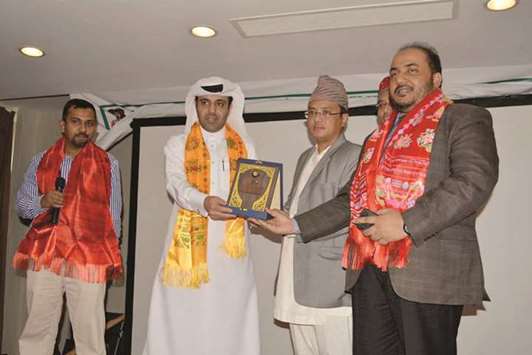The Nepal Non-Resident Federation of Indigenous Nationalities-Qatar (NNFIN) is a sister organisation of Nepal Federation of Indigenous Nationalities (NFIN) and actively promotes ethnic art and culture of Nepal in Qatar.
Community caught up with President Debaraj Rai and talked about the activities of NNFIN. Following are the excerpts.
Why did you feel the need of NNFIN in Qatar?
NNFIN was established in 2006, and it is the Qatar chapter of NFIN. It was established with the collaboration of five organisations already working for the welfare of ethnic Nepalis in Qatar. We felt the need of an umbrella organisation like NNFIN to strengthen indigenous people’s unity, harmony and brotherhood, and to create awareness among Nepali expats regarding the indigenous culture.
Can you tell us how many of the Nepalis in Qatar fall under NNFIN’s purview?
NNFIN is an umbrella organisation to 13 different ethnic organisations active in Qatar. These organisations represent Magars, Kirats, Gurungs, Rais, Tamangs, Tharus, Sherpas, Sunuwars, Bhujels, Newars and Majhis among other ethnic groups. In regard to number of ethnic/indigenous Nepalis, we can say they are about 150,000 of them in Qatar.
How do you function as an organisation directed towards the welfare of indigenous expatriates? How do you relate it with NFIN working for political rights of ethnic/indigenous communities in Nepal?
Every ethnic organisation under NNFIN is operating in its own way for its community and they provide services prioritising their goals. We are into philanthropic and social service activities. As we are associated with NFIN, we also support its initiative on lobbying for political rights of ethnic/indigenous communities in Nepal.
How do you co-ordinate between the 13 organisations that fall under your purview?
Each organisation has its own structure and objectives, but we all have some common agendas in terms of preservation, promotion and development of indigenous languages, scripts, religions, cultures and literatures. Furthermore, we come together to voice our support for empowerment and proportionate representation of ethnic/indigenous communities. This common ground inspires us to co-ordinate our programmes.
How do you assess the situation of migrant workers with ethnic/indigenous background regarding their treatment in job stations and how well have they been facilitated by manpower agencies back in Nepal?
I would say ethnic/indigenous workers are diligent, honest, dedicated and responsive towards their duties. There are two key actors: manpower agencies and candidates aspiring to come and work here. Both should be equally honest. As all sectors are in the process of gradual development, we need to provide better feedback [to manpower agencies and other organisations working for welfare] in order to expect something good.
Nepalese labour force is one of the biggest contributors to infrastructural development of Qatar. How can we strengthen the bilateral ties further?
I think all the bilateral ties have to be developed at the diplomatic level. As for us, we must respect the local laws and order; we should also give our full strength to support and favour Qatar in the current situation.
There are other organisations too, like the Qatar chapter of Non-Resident Nepalese Association (NRNA). How and on what matters does NNFIN co-ordinate with these organsiations and Qatari state agencies?
We all have some common agendas, like working towards the welfare of migrant labour force in Qatar. Our co-ordination with NRNA and state agencies is mainly on migrant workers’ health and safety awareness, traffic awareness, health campaign, blood donation and during natural disasters in Nepal.
Can you tell us about the current programmes launched by NNFIN and previous philanthropic efforts directed toward indigenous Nepali communities both in Nepal and Qatar?
We have been providing support to indigenous and other communities. We have been providing scholarships to students in Nepal who are from poor backgrounds, providing financial support to poor patients who are suffering from serious diseases like kidney failure, liver failure and cancer, etc. We are also providing support in accidents and to migrant workers who face documentation problems. We are planning to form a fund through which we will conduct philanthropic activities.
How do you think issues related to the rights of indigenous community should be solved in Nepal?
Nepal government has to address the burning demands of indigenous people by guaranteeing them inclusive and proportionate representation in all its bodies; and previous agreements between ethnic community and government should be enacted and implemented.
Do you have a message for the indigenous Nepalese working and contributing to Qatar and their families and the state of Nepal?
I would suggest them to focus on their own health and safety, respect the local law and order, be honest towards their official duties and be responsible towards their families.

Debaraj being honoured by the Nepali indigenous society for his contributions in Qatar.
